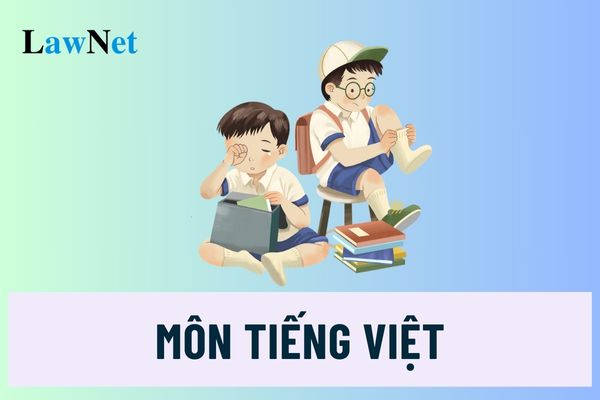What are regulations on Vietnamese Language curriculum in the Literacy Eradication Program in Vietnam?
What are the objectives of the Vietnamese Language curriculum in the Literacy Eradication Program in Vietnam?
Based on Section 1, Part 2 of the Literacy Eradication Program issued together with Circular 33/2021/TT-BGDDT,the objectives of the Vietnamese Language curriculum in the Literacy Eradication Program in Vietnam are as follows:
General Objectives
- Help learners form and develop essential qualities: patriotism, kindness, diligence, honesty, and responsibility; nurture the soul, form personality and develop individuality.
The Vietnamese Language subject helps learners initially explore themselves and the world around them, understand people, have a rich soul life, have a humanistic perspective on life and behavior; have a love for Vietnamese language and literature; be aware of the origin and identity of the nation, contributing to preserving and developing the cultural values of Vietnam; have the spirit to absorb the cultural quintessence of humanity and initially have the ability to integrate internationally.
- Help learners develop general competencies: self-autonomy and self-learning, communication and cooperation, problem-solving and creativity. Particularly, the Vietnamese Language subject helps learners develop language skills in all reading, writing, speaking, and listening skills at a basic level.
Specific Objectives
- Help learners form and develop essential qualities with specific manifestations: love for nature, family, homeland; have a love for the Vietnamese language and form the habit of preserving its purity and richness; be aware of the roots; have an interest in learning, be conscious of fulfilling responsibilities towards family, community, and society; contribute to forming the socialist Vietnamese personality.
- Help learners initially form general competencies, develop language skills in all reading, writing, speaking, and listening skills at a basic level: read texts correctly and fluently; understand the main content and information of the text; relate and compare outside the text; write correctly in terms of spelling and grammar; write some sentences, paragraphs, short essays (mainly narrative and descriptive essays); speak clearly; listen and understand the speaker's ideas.
Initially form and develop literary competence with the requirement to differentiate between poetry and stories, know how to read poetry and stories; understand and be moved by the beauty and goodness of people and the surrounding world as expressed in literary texts.
- Help learners form learning methods, thinking methods, and ways to apply the knowledge and skills obtained as a basis for lifelong learning.

What are regulations on Vietnamese Language curriculum in the Literacy Eradication Program in Vietnam? (Image from Internet)
What are the requirements for essential qualities and general competencies in the Vietnamese Language curriculum of the Literacy Eradication Program in Vietnam?
According to Section 2, Part 2 of the Literacy Eradication Program issued together with Circular 33/2021/TT-BGDDT, the requirements for essential qualities and general competencies are as follows:
The Vietnamese Language subject contributes to forming and developing essential qualities and general competencies in learners, at levels appropriate to the subject and educational stage as specified in the First Part.
What are the requirements for specific competencies in the Vietnamese Language curriculum of the Literacy Eradication Program in Vietnam?
Based on the regulations in Part 2 of the Literacy Eradication Program issued together with Circular 33/2021/TT-BGDDT, the requirements for specific competencies in the Mathematics curriculum of the Literacy Eradication Program include:
(1) Language Competence
- Read texts correctly, fluently, and expressively; understand the main content of the text, mainly the explicit content; initially understand implicit content such as the theme, lessons learned from the reading text.
Reading requirements include reading techniques and reading comprehension skills. For periods 1 and 2, focus on reading correctly at a suitable speed and understanding simple text contents. For periods 3, 4, and 5, place more emphasis on understanding specific content, the theme, and lessons drawn from the text.
- From periods 1 to 3, write correctly in terms of spelling, vocabulary, grammar; write some sentences, short paragraphs; in periods 4 and 5, initially write short complete essays, mainly narrative and descriptive essays, and simple introductions.
Write texts that retell stories read, witnessed events, experiences, and stories imagined and conjured up; describe familiar objects and phenomena; introduce objects and activities close to learners' lives.
Write paragraphs expressing learners' feelings and thoughts when reading a story or poem, witnessing an event that evokes their emotions; present opinions on simple issues in learning and life; write some types of texts such as autobiographies, messages, invitations, schedules, applications, etc.; initially know how to write following a process; the writing should have three parts (introduction, body, conclusion).
- Present ideas and feelings understandably; initially know how to use appropriate gestures and expressions when speaking; retell clearly stories read or heard; know how to share and exchange feelings, attitudes, and thoughts about discussed issues; know how to explain an object or a simple process.
- Listen and understand with an appropriate attitude and grasp the basic content; recognize the speaker's emotions; know how to respond to what has been heard.
(2) Literary Competence
Distinguish between prose and poetry texts (prose passages and verse passages); recognize the content of the text and the attitudes and emotions of the writer; initially understand the effects of some formal elements of literary texts (language, characters, plot, rhyme, comparisons, personification). Know how to associate, imagine, and express literarily in writing and speaking.
For periods 1 and 2: recognize whom and what the text is about; recognize characters in stories, rhymes in poetry; distinguish between stories and poetry.
For periods 3, 4, and 5: know how to read expressively literary texts; retell and summarize the main content of a story or poem; comment on characters, events and the writer's attitude and emotions in the text; recognize time and place, some types of rhymes, poetic rhythm, beautiful and unique words and images, and the effects of rhetorical devices such as personification and comparison.
Understand the meaning or lessons learned from the text. Write paragraphs and essays that narrate stories and describe subjects, expressing feelings and the ability to associate and imagine.

